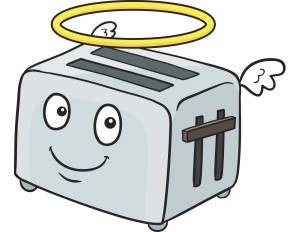 Most of you know by now that we enjoy naming our kitchen appliances. Maybe we’re just eccentric, but sometimes we think these inanimate objects are more … well, animated than a few people we know. These appliances are a big part of our interactions in the kitchen, and we’ve come to view them as faithful friends and allies in our culinary misadventures. Keep in mind that these little guys continue to inspire us — through their various mechanical traits and duties — with many lessons about life, love, relationships, and the nature of God, and perhaps you’ll understand why we’ve grown so fond of these “angels in the kitchen”! (Incidentally, the word Angel means “messenger.”)
Most of you know by now that we enjoy naming our kitchen appliances. Maybe we’re just eccentric, but sometimes we think these inanimate objects are more … well, animated than a few people we know. These appliances are a big part of our interactions in the kitchen, and we’ve come to view them as faithful friends and allies in our culinary misadventures. Keep in mind that these little guys continue to inspire us — through their various mechanical traits and duties — with many lessons about life, love, relationships, and the nature of God, and perhaps you’ll understand why we’ve grown so fond of these “angels in the kitchen”! (Incidentally, the word Angel means “messenger.”)
So far we’ve written about: Luke and Nuke, the twin microwaves; Thor, the mighty blender; Captain Keurig, the coffeemaker; Mac, the knife block; Fridgey, the refrigerator; Sparky, the gas range; Mister Freeze, the upright freezer (who lives in the garage with Blue the SUV); and our feisty little toaster who can talk. This swinging crowd of kitchen companions is frequently entertained by the musical broadcasts of Orson, from his perch on the country china hutch. (Although we haven’t discussed him previously, Orson is our antique cathedral-style radio!) And by the way, we’re typing this on Hal, our desktop computer.
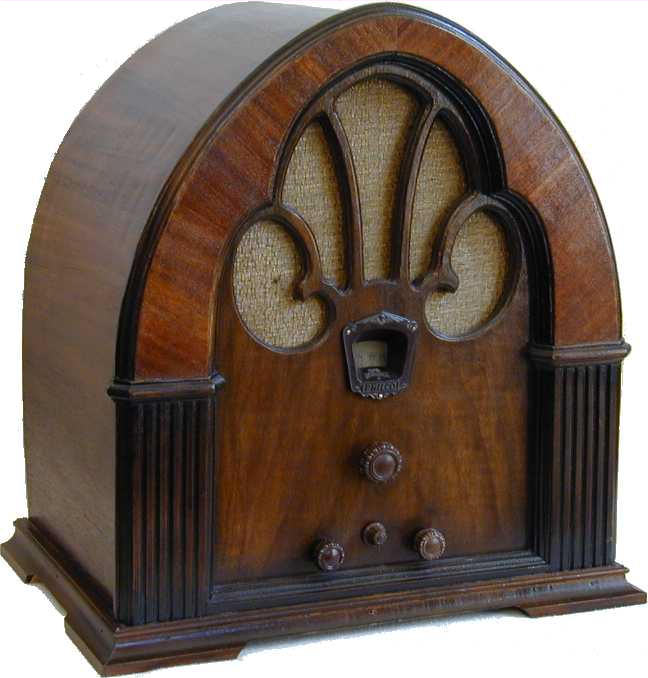
We’ve also written about pots and pans, boxes and bags, weird cookbooks and funky foods. And that, dear friends, is pretty much the whole gang. Only we can’t shake that sinking feeling that we’ve forgotten someone very important; that in our haste we’ve overlooked something vital to the smooth functioning of the kitchen. Oh, wait a minute. Hear that noise? It’s the indignant gurglings of … the sink! Okay, okay, that’s Señorita Sink, thank you very much! And she’s tired of being overlooked and underestimated.
Have you ever stopped to think how important the kitchen sink truly is? It’s the source of water in the kitchen, and without it, you can’t maintain a continuous free flow of that water. After all, as the water flows out of the faucet, it also has to have a place to flow to — unless you want your socks to get wet!
The sink is a handy place to prepare fruits and veggies for salads and stews. It’s also the place where we gather our dirty dishes — and the place where we wash them. Were we to suddenly lose our sink, we’d sorely miss it. We’d be losing an important member of our kitchen family, one which facilitates the roles of all the other appliances and gadgets. And yet, most people never even think about the sink. It’s practically invisible, in fact: underestimated, devalued, neglected and overlooked!
When you visit the kitchen of a new homeowner, the host will excitedly show off the glistening new range, demonstrate the ice maker on the sparkling new refrigerator, and emphasize the spaciousness of the custom cabinets. But how often does he or she take you to the sink and gush about its wonders? When people walk into a home appliance showroom, they tend to gravitate to the section where the latest model washers, dryers, ranges and refrigerators are displayed. Does anyone ever head straight to the plumbing section — because they can hardly wait to check out the latest in new sink designs?

In society, we have an organization that’s just as vital as the kitchen sink, and just as undervalued and overlooked. It’s the church! Or, if you prefer, the Body of Christ; the faith community; any place where believers assemble — a sink by any other name is just as neglected.
 The church, like the sink, is a source of water (the water of the Word); and it facilitates the continuous free flow of the Word in society. It’s a place where spiritual food is prepared. It’s a place where dirty dishes (soiled vessels for God) can congregate — and be washed! But we tend to overlook its importance. We underestimate its influence in the proper functioning of our communities and … yes, even of our government. And many of us totally neglect it. We don’t drag our friends to it and gush about its wonders. Nor do we consider its presence important when we’re shopping for a new home. It’s often just an invisible afterthought in our towns and cities.
The church, like the sink, is a source of water (the water of the Word); and it facilitates the continuous free flow of the Word in society. It’s a place where spiritual food is prepared. It’s a place where dirty dishes (soiled vessels for God) can congregate — and be washed! But we tend to overlook its importance. We underestimate its influence in the proper functioning of our communities and … yes, even of our government. And many of us totally neglect it. We don’t drag our friends to it and gush about its wonders. Nor do we consider its presence important when we’re shopping for a new home. It’s often just an invisible afterthought in our towns and cities.
But were we to suddenly lose the church (and its Godly influence in society), we’d sorely miss it. Trust us, things just wouldn’t be the same! So ask yourself, do you have that sinking feeling you’re neglecting something important? We hope it’s not your neighborhood church!
 Please, find a local faith community, attend regularly, and become engaged in serving. Support it, and pray for its hard-working spiritual leaders. “And let us not neglect our meeting together, as some people do, but encourage one another, especially now that the day of His return is drawing near.” (Hebrews 10:25 NLT)
Please, find a local faith community, attend regularly, and become engaged in serving. Support it, and pray for its hard-working spiritual leaders. “And let us not neglect our meeting together, as some people do, but encourage one another, especially now that the day of His return is drawing near.” (Hebrews 10:25 NLT)

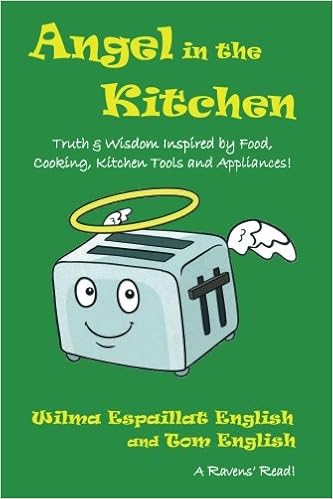
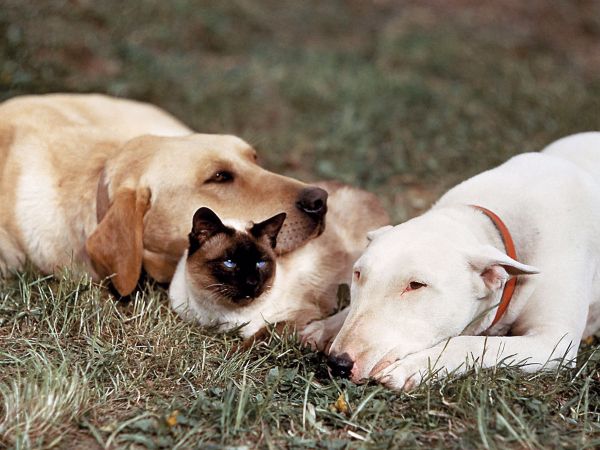 f two dogs and a Siamese cat, this time our heroes are a loudmouthed radio, a whiny electric blanket, a fairly bright desk lamp, a tough vacuum cleaner (named Kirby); and their intrepid leader, the eponymous hero of The Brave Little Toaster !
f two dogs and a Siamese cat, this time our heroes are a loudmouthed radio, a whiny electric blanket, a fairly bright desk lamp, a tough vacuum cleaner (named Kirby); and their intrepid leader, the eponymous hero of The Brave Little Toaster !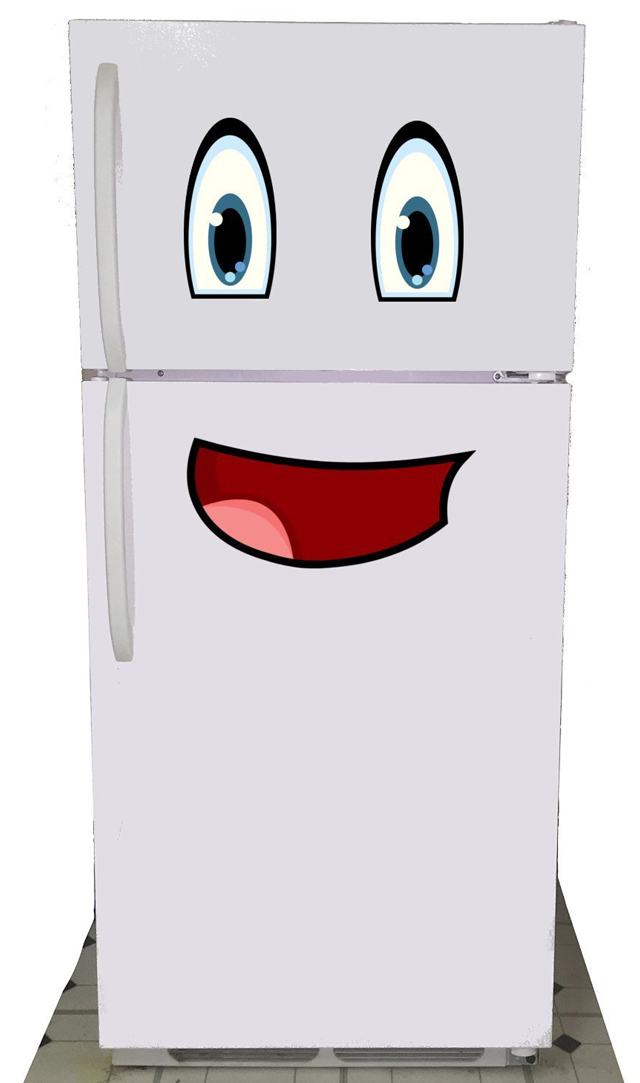 When we first got our new refrigerator, before we got used to what he wanted to tell us, we’d often awaken from a deep sleep thinking that someone was downstairs raiding the kitchen: Fridgie calls out to us like a distant foghorn shrouded in the night mist, gently reassuring us that he’s protecting our food from spoiling. Periodically he alerts us that there’s plenty of ice ahead (crescents, not bergs) for a glass of tea or soda, by periodically sounding off with an encouraging ker-chunk! Now, whenever we hear Fidgie talking in the middle of night, we just go back to sleep. We’ve come to recognize the sound of his voice!
When we first got our new refrigerator, before we got used to what he wanted to tell us, we’d often awaken from a deep sleep thinking that someone was downstairs raiding the kitchen: Fridgie calls out to us like a distant foghorn shrouded in the night mist, gently reassuring us that he’s protecting our food from spoiling. Periodically he alerts us that there’s plenty of ice ahead (crescents, not bergs) for a glass of tea or soda, by periodically sounding off with an encouraging ker-chunk! Now, whenever we hear Fidgie talking in the middle of night, we just go back to sleep. We’ve come to recognize the sound of his voice!